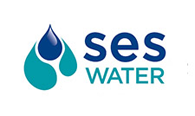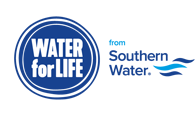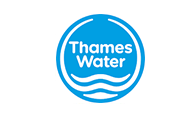Launch of Hampshire Water Transfer and Water Recycling Project public consultation
Southern Water’s consultation on the Hampshire Water Transfer and Water Recycling Project is an important part of the Development Consent Order process, to involve the local community in the development of its plans for this important new water resource.
WRSE’s Technical Director, Meyrick Gough, explains the importance of the scheme, and others like it, in the regional plan and the role water recycling will play in making our water supplies more resilient in the future.

In South East England, more than half the water we use comes from natural underground sources.
Winter rainfall seeps into the ground and is stored in aquifers, underground layers of rock that hold the water until it is abstracted through a network of boreholes, before being treated and put into supply.
Many of these aquifers are the main source of water to the region’s chalk rivers and streams.
So, when we experience prolonged dry weather, flows can reduce and impact on the ecology of these precious habitats.
Traditionally, we have relied heavily on these sources because they produce high quality and reliable water supplies.
However, as the climate changes, the environment will need to adapt which means we need to rethink where we source our water from and how we make our supplies resilient to more severe and frequent droughts.
Step forward water recycling.
This alternative source of water will always available and is not dependent on weather conditions, so will be there whenever we need it. It can work alongside more traditional water sources, supplementing river flows and topping up reservoirs when low rainfall levels deplete our supplies.
The process of recycling wastewater already happens in many of our rivers as part of the water cycle and treated wastewater is an important contributor to the flows within them.
Recycling schemes will build on this, increasing our management of this natural cycle and turning more wastewater into a vital resource that will help our rivers to flow and our taps to run as our climate changes.
It is for this reason it is already used extensively elsewhere in the world, including California, Australia and Singapore.
They have trail-blazed the advanced, multi-stage treatment technology and safeguards required to ensure drinking water continues to be of the highest quality. Lessons from which will be followed in the UK.
Regional plans have been developed to identify the optimum solution for managing water resources across a region, without being constrained by the boundaries of water companies and enabling all feasible options to be taken into account.
The WRSE regional plan considered some 2,000 options. This included 137 water recycling schemes in a number of locations and a range of sizes.
Our regional modelling identified that six of these schemes need to progress in the South East over the next 10 years to enable us to serve the growing population, prepare for climate change and leave more water in the environment.
The Hampshire scheme is one of the larger recycling options in the regional plan and a critical part of the solution to replace the water that will no longer be abstracted from the River Test and River Itchen when flows within them drop too low.
It combines utilising the additional storage provided by the under-construction reservoir at Havant Thicket with a new transfer that will move water from Havant to the west of Hampshire.
Our regional modelling has also shown that longer term, as new sources of water and strategic transfers around the region are developed, the water it provides could also be moved in the other direction, into West Sussex, to help address the challenges being faced in that part of the region too.
It is this future-looking insight, which is why regional plans are now such an important part of how we plan our water resources.
Combined, of course, with significant reductions in leakage and consumption, it is this blend of new sources, increased storage, and greater connectivity that will build our resilience to drought and enable us to reduce our reliance of unsustainable water sources, so our water resources infrastructure is ready for the future.
To find out more about WRSE’s regional plan visit www.wrse.org.uk







